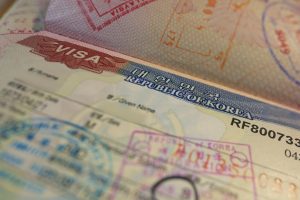South Korea at one time topped all other countries in the region in one export to its allies in the West – children.
Since 1953, over 200,000 Korean children have left the shores of the small peninsular country to be adopted by families in the United States, Europe, and other allied nations. More than half of all Korean adoptees have found themselves in the United States, while France and Sweden are the second and third highest receiving countries respectively, according to the Korean Adoptees Ministry.
The number of adoptees has dwindled in recent years. Meanwhile, Korea’s strong cultural identity has led to a program that invites adoptees back home with a pathway to reconnect with their homeland.
Among the over 15,000 Korean adoptees living in the U.S. state of Minnesota is one woman who has helped to reshape the legislation around overseas adoptees for almost 25 years.
“I was so uncomfortable having to leave my birth country, the place I was born,” said Ami Nafzger.
“I have struggled all my life to accept the fact that I am Korean, and then [was] being asked to leave my country of origin every three months because I am just a foreigner to the Korean government. This hurt me so badly, along with the reception and treatment I had by native Koreans while trying to live in Korea.”
These experiences led Nafzger to found the Global Overseas Adoptees’ Link (G.O.A.’L.).
The need for G.O.A.’L. became apparent when Nafzger was living in Gumi, south of Seoul. She was working for a hagwon, a for-profit educational institution, but soon found it was difficult for her to stay in South Korea, despite it being the country of her birth.
As a “foreigner,” Nafzger was told she would have to leave the country every three months to keep renewing her work visa. The situation was made worse by the fact that much of her work at the hagwon went unpaid.
“This is when I felt there was a need to ask the government for a special visa for people like me, an adoptee and/or foreign Korean,” said Nafzger by email. “Between 1996 and 1998, I traveled to Seoul from Gumi, back and forth every weekend to find other adoptees and Korean government officials to help me. During winter [of] 1997 I was told this should be done formally, so this is when I started asking people to help me create an organization and post-adoption services , a 5-7 year project, but no one wanted to help.”
Nafzger finally moved to Seoul in 1998 and met several adoptees and native Koreans who helped her complete her task and get the attention of the media. G.O.A.’L. was officially founded March 15 of that year, with the mission of providing services such as birth searches, translation services, homestays (a program to help adoptees reside in South Korea), and requesting a special visa for adoptees and foreign Koreans. Those involved had already been hard at work, amassing a volunteer pool of over 600 for a petition effort.
“We would stand in the streets of Myung Dong every weekend and sometimes during the weekday evenings petitioning,” said Nafzger, who was G.O.A.’L.’s secretary general at the time. “We did receive over 2,000 signatures. Additionally, in July 1999 we pushed for this special visa at the first Korean Adoptee G.O.A.’L. Conference in Suwon City.”
The Korean government contacted Nafzger and her team shortly after, informing them that they would create the F-4 Visa. South Korea passed the Act on the Immigration and Legal Status of Overseas Koreans in September 1999, to go into effect that December.
From 1996 to December 1999, when the legislation went into effect, G.O.A.’L. was made up of 40 full time volunteers and about 100 in total. Upon creation of the visa, the organization was informed about the specific instructions adoptees needed to follow in order to acquire the F-4. Nafzger said that Korean adoptees living in the country at the time immediately applied for the new visa, with at least 100 applications in the first few months.
Since then G.O.A.’L. has created a “step-by-step process” for applying for “a spectrum” of visas and for citizenship, updating adoptees whenever changes are made to the law, according to Kara Rickmers, current secretary general of G.O.A.’L.
“Today we’re seeing kind of a shift,” said Rickmers.
According to her, applications from second-generation adoptees (the children of adoptees) are booming lately. Now there are even jobs in South Korea that specifically seek out F-4 visa holders, Rickmers said, although the F-4 does not require work or study to remain valid.
But the group does more than just facilitating visa applications. “G.O.A.’L. was known as an Uber for adoptees the moment they arrive to Korea,” explained Nafzger. “Whether they were from France, Italy, Denmark, Germany, Canada, Australia, the USA, adoptees would call my cell phone… I would send out a group of volunteers to the airport and we would bring them to a homestay, help them with translation, help them apply for the F-4 visa, find Korean language classes, find a job, educate about the Korean culture’s do’s and don’ts, conduct a birth search and reunion and so much more.”
While initially experiencing some resistance, Nafzger’s use of the media captured the attention of the Korean government. The authorities eventually saw the difficulties of adoptees, at home and abroad, and the positive impact the visa could have for them and for South Korea.
“Back in the 1990s adoptees were not supported and had no support system to help them in Korea, even with the smallest things,” Nafzger said. “I thought if I have so many struggles here, I know others have too.”
A lot has changed for adoptees in the 25 years since the Act on Overseas Koreans was adopted. Thousands of Koreans have reconnected with their homeland thanks to the work of Nafzger and G.O.A.’L.

































